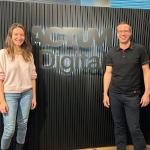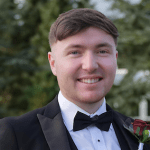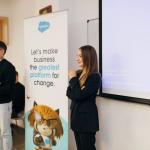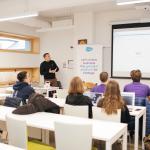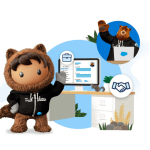Solution Engineers, Presales, Solution Consulting, Sales Engineers or Sales Consultants. Call them what you will, I call them creative geniuses.
An SE (Solution Engineer) is a person who works alongside a salesperson to discover a customer’s business challenges and creates a unique solution prototype to present back to their decision-makers, illustrating value and benefits via an engaging story. This (when done well) usually equates to a sale and ROI for the customer.
My whole career has been about SEs. I’ve been an SE for eleven years at three different software companies, two of the largest American software companies, and for the last four years, I’ve had the pleasure of leading a team of SEs here at Salesforce across two regions.
In my experience, there are many diverse backgrounds that make up the best and most successful SEs. SEs are both women and men of different nationalities and cultures. There is often a misunderstanding that technical ability is essential. While this is valuable, having strong business acumen is just as important. They can be generalised into two broad categories: the techie SE and the business SE.
The Technical SE
The technical SE is the one who might also be called the ‘propeller head’ or ‘super geek’. Interestingly, when you work in these circles these names are not often used. The technical SEs I have had the pleasure to work alongside and lead are so much more than this. They are the problem solvers and the challengers. They ask the question of how is this going to work. Rather than being the yes-person. They offer detailed, technical explanations for strategic decisions and any future implications of these.
There are many aspects of the technical side of Salesforce including security, encryption, APIs, integration, data strategies and the list goes on. For example, Wayne Moore [Principal Solution Engineer] worked with Ovo Energy – an independent energy supply company buying and selling electricity and gas to supply both the domestic and business energy market throughout the UK – to position Salesforce as their single platform for customer engagement and their critical integration needs.
The Business SE
The business SE has many of the same qualities as the above and tends to ask why. They can offer a different type of explanation to business users about usability and impact on the business, future strategy plans and critical customer success. As Salesforce is mostly configuration rather than code, business SEs have a vast amount of bandwidth to surprise and delight their customers with creative, benefit-rich solution prototypes. A great recent example of this success is John O’Mahoney [Principal Solution Engineer] who worked closely with VAX to help them transform their customer experience with unified information, engaged staff and live chat.
I consider my team to be well-balanced when I have a collection of both. Rockstars are created in all manner of cauldrons. Of course, there are the traditional backgrounds like myself – IT degree straight into Presales. Others may surprise you like training, IT, sales and support backgrounds bringing varied skills.
Most job descriptions include nouns that discuss the ‘things’ an SE needs to excel in. I rewrote our SE job description to include adjectives, which describe the personality traits I have witnessed in the best. These are curious, creative, empathetic, patient, clever, trustworthy, friendly, confident, problem solver and challenging.
Perhaps you’re like me and never knew about this type of role, let alone considered it.
Believe in yourself, if this resonates give it a go! Come and join the #SalesforceOhana.




